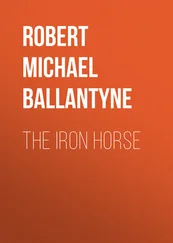Robert Michael Ballantyne - Black Ivory
Здесь есть возможность читать онлайн «Robert Michael Ballantyne - Black Ivory» — ознакомительный отрывок электронной книги совершенно бесплатно, а после прочтения отрывка купить полную версию. В некоторых случаях можно слушать аудио, скачать через торрент в формате fb2 и присутствует краткое содержание. Жанр: foreign_children, literature_19, foreign_antique, foreign_prose, на английском языке. Описание произведения, (предисловие) а так же отзывы посетителей доступны на портале библиотеки ЛибКат.
- Название:Black Ivory
- Автор:
- Жанр:
- Год:неизвестен
- ISBN:нет данных
- Рейтинг книги:5 / 5. Голосов: 1
-
Избранное:Добавить в избранное
- Отзывы:
-
Ваша оценка:
- 100
- 1
- 2
- 3
- 4
- 5
Black Ivory: краткое содержание, описание и аннотация
Предлагаем к чтению аннотацию, описание, краткое содержание или предисловие (зависит от того, что написал сам автор книги «Black Ivory»). Если вы не нашли необходимую информацию о книге — напишите в комментариях, мы постараемся отыскать её.
Black Ivory — читать онлайн ознакомительный отрывок
Ниже представлен текст книги, разбитый по страницам. Система сохранения места последней прочитанной страницы, позволяет с удобством читать онлайн бесплатно книгу «Black Ivory», без необходимости каждый раз заново искать на чём Вы остановились. Поставьте закладку, и сможете в любой момент перейти на страницу, на которой закончили чтение.
Интервал:
Закладка:
“W’y, you speaks like a book, sir,” said Disco, emitting a prolonged puff, “an’ it ain’t for the likes me to give an opinion on that there; but if I may make bold to ax, sir, how do you mean to travel—on the back of a elephant or a ry-noceris?—for it seems to me that there ain’t much in the shape o’ locomotives or ’busses hereabouts—not even cabs.”
“I shall go in a canoe,” replied Harold; “but my reason for broaching the subject just now is, that I may ask if you are willing to go with me.”
“There’s no occasion to ax that sir; I’m your man—north or south, east or west, it’s all the same to me. I’ve bin born to roll about the world, and it matters little whether I rolls ashore or afloat—though I prefers the latter.”
“Well, then, that’s settled,” said Harold, with a look of satisfaction; “I have already arranged with our agent here to advance me what I require in the way of funds, and shall hire men and canoes when we get down to the Zambesi—”
“The Zam-wot, sir?”
“The Zambesi; did you never hear of it before?”
“Never, nor don’t know wot it is, sir.”
“It is a river; one of the largest on the east coast, which has been well described by Dr Livingstone, that greatest of travellers, whose chief object in travelling is, as he himself says, to raise the negroes out of their present degraded condition, and free them from the curse of slavery.”
“That’s the man to my mind,” said Disco emphatically; “good luck to him.—But w’en d’you mean to start for the Zambizzy, sir?”
“In a few days. It will take that time to get everything ready, and our money packed.”
“Our money packed!” echoed the sailor, with a look of surprise, “w’y, wot d’ye mean!”
“Just what I say. The money current in the interior of Africa is rather cumbrous, being neither more nor less than goods. You’ll never guess what sort—try.”
“Rum,” said Disco.
“No.”
“Pipes and ’baccy.”
Harold shook his head.
“Never could guess nothin’,” said Disco, replacing the pipe, which he had removed for a few moments from his lips; “I gives it up.”
“What would you say to cotton cloth, and thick brass wire, and glass beads, being the chief currency in Central Africa?” said Harold.
“You don’t mean it, sir?”
“Indeed I do, and as these articles must be carried in large quantities, if we mean to travel far into the land, there will be more bales and coils than you and I could well carry in our waistcoat pockets.”
“That’s true, sir,” replied Disco, looking earnestly at a couple of negro slaves who chanced to pass along the neighbouring footpath at that moment, singing carelessly. “Them poor critters don’t seem to be so miserable after all.”
“That is because the nigger is naturally a jolly, light-hearted fellow,” said Harold, “and when his immediate and more pressing troubles are removed he accommodates himself to circumstances, and sings, as you hear. If these fellows were to annoy their masters and get a thrashing, you’d hear them sing in another key. The evils of most things don’t show on the surface. You must get behind the scenes to understand them. You and I have already had one or two peeps behind the scenes.”
“We have indeed, sir,” replied Disco, frowning, and closing his fists involuntarily, as he thought of Yoosoof and the dhow.
“Now, then,” said Harold, rising, as Disco shook the ashes out of his little black pipe, and placed that beloved implement in the pocket of his coat, “let us return to the harbour, and see what chance there is of getting a passage to the Zambesi, in an honest trading dhow—if there is such a thing in Zanzibar.”
On their way to the harbour they had to pass through the slave-market. This was not the first time they had visited the scene of this iniquitous traffic, but neither Harold nor Disco could accustom themselves to it. Every time they entered the market their feelings of indignation became so intense that it was with the utmost difficulty they could control them. When Disco saw handsome negro men and good-looking girls put up for public sale,—their mouths rudely opened, and their teeth examined by cool, calculating Arabs, just as if they had been domestic cattle—his spirit boiled within him, his fingers tingled, and he felt a terrible inclination to make a wild attack, single-handed, on the entire population of Zanzibar, though he might perish in the execution of vengeance and the relief of his feelings! We need scarcely add that his discretion saved him. They soon reached the small square in which the market was held. Here they saw a fine-looking young woman sold to a grave elderly Arab for a sum equal to about eight pounds sterling. Passing hastily on, they observed another “lot,” a tall stalwart man, having his various “points” examined, and stopped to see the result. His owner, thinking, perhaps, that he seemed a little sluggish in his movements, raised his whip and caused it to fall upon his flank with such vigour that the poor fellow, taken by surprise, leaped high into the air, and uttered a yell of pain. The strength and activity of the man were unquestionable, and he soon found a purchaser.
But all the slaves were not fine-looking or stalwart like the two just referred to. Many of them were most miserable objects. Some stood, others were seated as if incapable of standing, so emaciated were they. Not a few were mere skeletons, with life and skin. Near the middle of the square, groups of children were arranged—some standing up to be inspected, others sitting down. These ranged from five years and upwards, but there was not one that betrayed the slightest tendency to mirth, and Disco came to the conclusion that negro children do not play, but afterwards discovered his mistake, finding that their exuberant jollity “at home” was not less than that of the children of other lands. These little slaves had long ago been terrified, and beaten, and starved into listless, apathetic and silent creatures.
Further on, a row of young women attracted their attention. They were ranged in a semicircle, all nearly in a state of nudity, waiting to be sold. A group of Arabs stood in front of them, conversing. One of these women looked such a picture of woe that Disco felt irresistibly impelled to stop. There were no tears in her eyes; the fountain appeared to have been dried up, but, apparently, without abating the grief which was stamped in deep lines on her young countenance, and which burst frequently from her breast in convulsive sobs. Our Englishmen were not only shocked but surprised at this woman’s aspect, for their experience had hitherto gone to show that the slaves usually became callous under their sufferings. Whatever of humanity might have originally belonged to them seemed to have been entirely driven out of them by the cruelties and indignities they had so long suffered at the hands of their captors. (See Captain Sulivan’s Dhow-chasing in Zanzibar Waters , page 252.)
“Wot’s the matter with her, poor thing?” asked Disco of a half-caste Portuguese, dressed in something like the garb of a sailor.
“Oh, notting,” answered the man in broken English, with a look of indifference, “she have lose her chile, dat all.”
“Lost her child? how—wot d’ee mean?”
“Dey hab sole de chile,” replied the man; “was good fat boy, ’bout two-yer ole. S’pose she hab carry him for months troo de woods, an’ over de hills down to coast, an’ tink she keep him altogether. But she mistake. One trader come here ’bout one hour past. He want boy—not want modder; so he buy de chile. Modder fight a littil at first, but de owner soon make her quiet. Oh, it notting at all. She cry a littil—soon forget her chile, an’ get all right.”
Читать дальшеИнтервал:
Закладка:
Похожие книги на «Black Ivory»
Представляем Вашему вниманию похожие книги на «Black Ivory» списком для выбора. Мы отобрали схожую по названию и смыслу литературу в надежде предоставить читателям больше вариантов отыскать новые, интересные, ещё непрочитанные произведения.
Обсуждение, отзывы о книге «Black Ivory» и просто собственные мнения читателей. Оставьте ваши комментарии, напишите, что Вы думаете о произведении, его смысле или главных героях. Укажите что конкретно понравилось, а что нет, и почему Вы так считаете.












